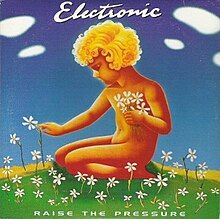Raise the Pressure
| Raise the Pressure | ||||
|---|---|---|---|---|
 | ||||
| Studio album by | ||||
| Released | 8 July 1996 | |||
| Recorded | 1994–1996 | |||
| Genre | Alternative rock, alternative dance, house | |||
| Length | 62:25 | |||
| Label | Parlophone (United Kingdom) Virgin (Europe) Warner Bros. (Australia, Japan, United States) | |||
| Producer | Bernard Sumner, Johnny Marr | |||
| Electronic chronology | ||||
| ||||
Raise the Pressure is Electronic's second studio album, released in July 1996.
Recording
[edit]Seven of the thirteen tracks were composed by full-time members Johnny Marr and Bernard Sumner, and the other six co-written with former Kraftwerk member Karl Bartos.[1] He was recommended to Electronic via a friend of Sumner's,[2] and commuted to Manchester throughout 1995 during the recording sessions,[3] which stretched from late 1994 to late 1995.
The protracted sessions resulted in a dense, thick production that was later acknowledged by both Sumner and Marr[4] and criticised in professional reviews;[3][5] they consequently spent much less time on their next album Twisted Tenderness.[1]
Raise the Pressure was also remarked upon for Bernard Sumner's impressionistic lyrics, which some saw as the result of his use of Prozac during this period,[1] following an appearance on the BBC 2 programme The Late Show, which explored the effects of the antidepressant on creativity.[6] According to Sumner, however, he only wrote one lyric whilst under the influence of Prozac.[3] Musically the album comprises guitar pop/rock songs ("One Day", "Out of My League") and more dance oriented tracks ("Until the End of Time", "If You've Got Love").
Artwork
[edit]The album cover is a painting of a cherub by Johannes Handschin, which echoes the sleeve of New Order's 1989 album Technique. The title of the album appears on the inner inlay sleeve of most CD releases; the Australian CD and cassette editions are two which have Raise the Pressure placed on the cover. This was the last Electronic album to be released on vinyl.
Reception
[edit]| Review scores | |
|---|---|
| Source | Rating |
| AllMusic | |
| Smash Hits | |
Unlike its predecessor Electronic, Raise the Pressure received mixed reviews[2][5][6] and did not perform as well commercially, with the first two singles "Forbidden City" and "For You" charting modestly in the UK Top 20, and the third, "Second Nature", barely making the Top 40. In the US no commercial singles were released, with "Forbidden City" and "Second Nature" issued only as promotional radio-play discs. Four mixes of "Until the End of Time" were released through the Electronic mailing list in October 1997; this item and a maxi single of "Second Nature" remixes are among the most sought-after recordings by the band.
In 2007 a download-only edition of Raise the Pressure was released on the iTunes Store, adding all five B-sides from the single releases. The remixes of "Until the End of Time" were also released on iTunes at this time.
Track listings
[edit]
Standard edition[edit]
|
iTunes bonus tracks[edit]
|
Personnel
[edit]- Bernard Sumner: vocals and keyboards
- Johnny Marr: guitars, bass and keyboards
- Produced by Electronic
- Engineered by James Spencer
- Thanks to Karl Bartos (keyboards), Denise Johnson (vocals), Ged Lynch (drums and percussion), Donald Johnson (drums on 4), Danny Saber (organ on 8), Guy Pratt (bass on 13), Alan Meyerson (mixing 1, 4, 5, 6, 7, 9, 12 & 13), James Spencer (mixing 2, 3, 8, 10 & 11), Andrew Berry, Russell Kearney, Kevin Jacobs, J.C., Ben Findlay, Jon Savage, Marcus Russell, Alec McKinlay, Abby Scott and all at Ignition.
- Cover illustration by Johannes Handschin.
- Electronic logo by Paul Barnes.
- Designed by Howard Wakefield @ Meiré und Meiré and Peter Saville.
- 1, 2, 5, 7, 12, 13, 14, 15 & 17 written by Marr, Sumner and Bartos.
- 3, 4, 6, 8, 9, 10, 11, 16 & 18 written by Marr and Sumner.
Charts
[edit]| Chart | Peak position |
|---|---|
| Australian Albums Chart[9] | 94 |
| UK Albums Chart | 8 |
| Billboard 200 | 143[10] |
| US Top Heatseekers | 7[10] |
References
[edit]- ^ a b c City Life, 31 March 1999
- ^ a b Blah Blah Blah, July 1996 (positive review)
- ^ a b c Uncut, April 1999
- ^ The Guitar Magazine, January 1997
- ^ a b Mojo, August 1996 (negative review)
- ^ a b Q, August 1996 (3/5)
- ^ AllMusic review
- ^ Needham, Alex (3 July 1996). "Albums: Best New Album". Smash Hits. p. 62. Retrieved 1 December 2024.
- ^ Ryan, Gavin (2011). Australia's Music Charts 1988–2010. Mt. Martha, VIC, Australia: Moonlight Publishing.
- ^ a b allmusic (link)
